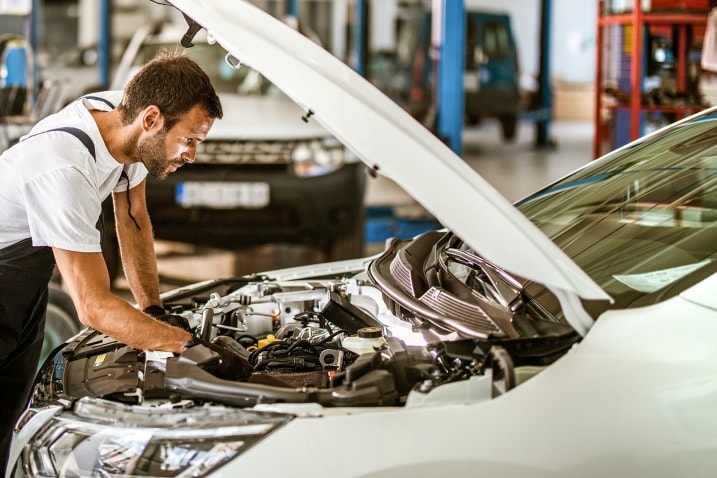All Categories
Featured

Modern automobiles are geared up with sophisticated engine control units (ECUs) that monitor and regulate numerous elements of the engine. These systems can discover issues prior to they end up being recognizable to the motorist, which is where engine diagnostics enter into play. Engine diagnostics is a powerful tool that allows mechanics to identify problems early, helping protect against major fixings and guaranteeing the long life of your automobile. Below's how engine diagnostics job and why they are vital for keeping your auto's health.
- What Are Engine Diagnostics? Engine diagnostics describe the process of using specialized devices to monitor and examine the performance of a car's engine. The diagnostic system within an automobile accumulates information from sensing units situated throughout the engine and various other essential parts, such as the exhaust, gas, and transmission system. This data is after that processed by the vehicle's onboard computer, which can find irregularities or malfunctions.
Auto mechanics can attach an analysis device, typically an OBD-II (Onboard Diagnostics) scanner, to your cars and truck's ECU to obtain mistake codes and real-time data. These codes indicate certain locations where the engine or other components might be experiencing problems, even before warning lights or efficiency changes are visible to the driver.
- Identifying Troubles Early. One of the most significant advantages of engine diagnostics is the capacity to recognize issues early, commonly prior to they intensify into major concerns. Little troubles, such as a misfiring ignition system, a damaged sensing unit, or an inefficient fuel injector, can slowly intensify if left untreated. Nonetheless, with early discovery through engine diagnostics, mechanics can deal with these minor issues before they create considerable damage.
As an example, if a sensing unit detects that the engine is running also lean or abundant (as well much or also little fuel), this could result in increased endure engine parts or inadequate gas efficiency. By diagnosing this very early, the technician can change the air-fuel blend, protecting against costly repairs in the future.
- Stopping Engine Damages. Gradually, issues with the engine's parts, such as the timing belt, exhaust system, or cooling down system, can cause extreme damages otherwise attended to promptly. For example, a getting too hot engine due to a falling short radiator or water pump can cause comprehensive inner damage, such as deformed cylinder heads or a blown gasket. Identifying problems early via the engine diagnostics system can protect against these circumstances from proceeding to disastrous engine failing.
The analysis system can additionally find concerns with the exhaust system, such as a malfunctioning catalytic converter, which could result in inadequate engine efficiency and eventual engine damage otherwise repaired.
- Decreasing Repair Work Prices. By determining and resolving minor concerns early, engine diagnostics can save you significant cash on repairs. When issues are caught early, fixings often tend to be less complex and a lot more inexpensive. For example, changing a faulty oxygen sensing unit or cleaning up a clogged up gas injector is reasonably economical compared to replacing an entire engine due to overlook.
Furthermore, engine diagnostics aid avoid unneeded repair work by identifying the precise root cause of the issue. Without diagnostics, auto mechanics might have to perform considerable testing and trial-and-error techniques to identify the issue, which can enhance both time and price.

- Improving Car Performance and Effectiveness. One more benefit of normal engine diagnostics is that it helps boost your automobile's efficiency and gas performance. If the engine is running efficiently and all systems are working efficiently, you will certainly experience better acceleration, smoother driving, and enhanced fuel economic situation. Engine diagnostics can disclose concerns such as a stopped up air filter, a malfunctioning mass air movement sensor, or a worn-out ignition system that could impede your cars and truck's performance.
For instance, a malfunctioning thermostat might create your engine to overheat or not reach its ideal operating temperature. A diagnostic check will help recognize this problem early, stopping getting too hot and guaranteeing your car runs at its best.
- Why Routine Diagnostics Issue. While lots of chauffeurs may think about engine diagnostics as something to do only when the "check engine" light appears, normal diagnostics should belong to regular automobile upkeep. Many automobile service center and dealers offer analysis checks as component of an annual service or tune-up. Normal analysis scans help catch issues prior to they trigger visible signs or failures, inevitably avoiding major repair services down the road.
It is likewise worth noting that if you're intending to sell or trade-in your vehicle, having a recent engine diagnostic report can be valuable. Prospective purchasers or dealers may be much more inclined to offer a higher trade-in worth or acquisition cost if they understand the automobile has actually been free and well-maintained of major engine problems.
- Verdict. Engine diagnostics play an essential role in maintaining your car running effectively and avoiding expensive repair services. By recognizing issues early, protecting against engine damage, reducing fixing costs, and improving performance, engine diagnostics guarantee your cars and truck stays trustworthy for years to come. Routine diagnostic checks as component of your vehicle's routine maintenance will help you catch little issues prior to they establish into major repairs, giving you satisfaction on the roadway and protecting your investment.
Latest Posts
Maintain Your Rug Looking Its Best with Easy, Expert Care
Published Apr 20, 25
1 min read
Where Taste Fulfills Enjoyable at Lucky Road
Published Apr 20, 25
1 min read
Safeguard Your Building with Washington Fence's Premium Products
Published Apr 20, 25
1 min read